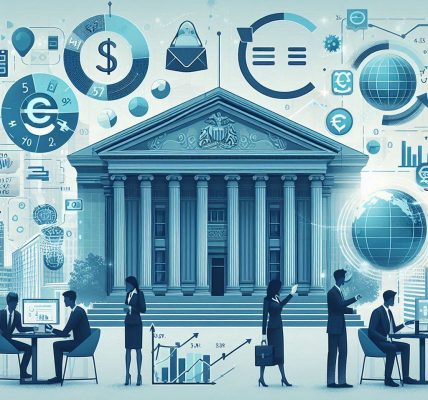Introduction
Artificial Intelligence (AI) is transforming industries, economies, and the way we live and work. As AI adoption accelerates, its impact on the global economy is becoming more evident. Businesses are leveraging AI for automation, data-driven decision-making, and innovation, while governments and policymakers are evaluating its broader economic implications.
This article explores how AI is disrupting traditional industries, creating new opportunities, and reshaping the workforce and global markets.
How AI is Disrupting Traditional Industries
1. Automation and Job Displacement
AI-driven automation is revolutionizing manufacturing, customer service, logistics, and other industries by replacing repetitive tasks with intelligent systems. While this improves efficiency, it also raises concerns about job displacement.
- Affected Industries: Manufacturing, retail, transportation, and customer service.
- AI-Driven Changes: Robotics in factories, AI-powered chatbots, and self-driving vehicles.
- Challenges: Workforce reskilling and unemployment risks in low-skill sectors.
2. Financial Services and AI-driven Trading
The finance sector is increasingly relying on AI for algorithmic trading, risk management, fraud detection, and customer service.
- AI Innovations: Predictive analytics, automated trading algorithms, and AI-powered chatbots.
- Impact: Faster trading decisions, reduced financial fraud, and improved customer experience.
3. Healthcare Revolution with AI
AI is enhancing diagnostics, drug discovery, and personalized medicine, making healthcare more efficient and accessible.
- AI in Healthcare: AI-driven diagnostics, robotic surgeries, and virtual health assistants.
- Impact: Faster disease detection, reduced medical costs, and better patient outcomes.
4. AI in Retail and E-commerce
AI is optimizing customer experience in retail through personalized recommendations, inventory management, and AI-powered chatbots.
- Key Innovations: AI-based recommendation engines, voice assistants, and supply chain automation.
- Impact: Improved customer satisfaction, reduced operational costs, and data-driven marketing strategies.
5. Cybersecurity and AI
AI is playing a crucial role in detecting cyber threats, preventing fraud, and ensuring data security.
- How AI Helps: Real-time threat detection, automated responses, and improved security analytics.
- Impact: Reduced cyber risks, enhanced privacy, and better fraud prevention.
Opportunities Created by AI
1. AI-driven Job Creation
While AI is replacing some jobs, it is also creating new opportunities in AI research, data science, and machine learning.
- Growing Demand: AI specialists, data analysts, and AI ethics consultants.
- Upskilling Needs: Investment in education and training programs for AI-related careers.
2. Economic Growth and Productivity Gains
AI enhances business productivity by automating routine tasks and optimizing decision-making.
- Business Benefits: Cost reduction, improved efficiency, and enhanced customer insights.
- Macroeconomic Impact: AI-driven GDP growth and increased competitiveness of AI-driven economies.
3. AI in Small and Medium Enterprises (SMEs)
AI tools are enabling SMEs to compete with larger enterprises by offering advanced analytics and automation at affordable costs.
- AI for SMEs: Chatbots, AI-powered marketing tools, and predictive analytics.
- Impact: Increased efficiency, better customer engagement, and revenue growth.
4. Smart Cities and AI-powered Infrastructure
AI is transforming urban development with smart traffic systems, energy-efficient buildings, and AI-driven public services.
- Key Technologies: AI-powered traffic control, smart grids, and predictive maintenance.
- Impact: Reduced congestion, lower energy consumption, and improved city planning.
5. AI in Education and Workforce Development
AI is revolutionizing education through personalized learning, AI tutors, and automation of administrative tasks.
- AI-powered Learning: Adaptive learning platforms and AI tutors.
- Impact: Enhanced student engagement, improved learning outcomes, and access to quality education.
Challenges and Ethical Considerations
1. Data Privacy and Security Risks
With AI’s reliance on big data, concerns about data privacy and misuse of personal information are growing.
- Challenges: Ethical data usage, AI bias, and regulatory compliance.
- Solution: Stronger data protection laws and AI transparency.
2. Ethical AI and Bias Issues
AI algorithms may unintentionally perpetuate biases, leading to unfair outcomes in hiring, lending, and law enforcement.
- Challenges: AI bias in recruitment, financial lending, and legal decisions.
- Solution: AI fairness policies and regular algorithm audits.
3. Government Regulations and AI Governance
Policymakers are working to create regulatory frameworks that balance AI innovation with ethical considerations.
- Key Areas: AI ethics, labor laws, and AI’s role in decision-making.
- Solution: Collaborative efforts between governments, businesses, and AI experts.
Conclusion
AI is undeniably transforming the global economy, offering both disruptions and opportunities. While some industries face automation-driven challenges, AI is also unlocking new avenues for innovation, efficiency, and job creation.
To maximize AI’s benefits while minimizing its risks, governments, businesses, and individuals must adapt through policies, education, and strategic investments. AI is not just the future; it is already reshaping our present economy. The key to success lies in leveraging AI responsibly and equitably for long-term economic growth.
Disclaimer
This article is for informational purposes only and does not constitute financial, legal, or career advice. AI trends and economic impacts are subject to change, and readers should conduct their own research or consult professionals before making AI-related decisions.




